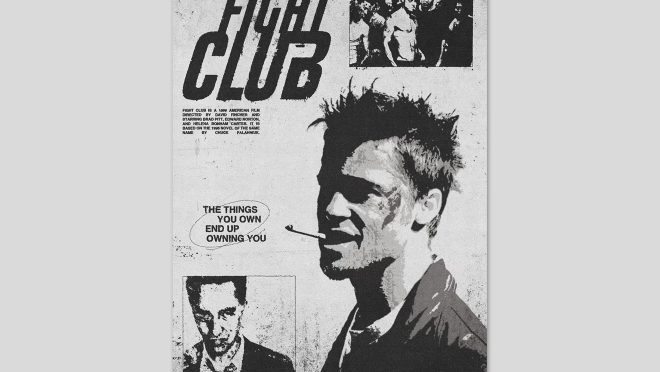Fight Club: A Timeless Masterpiece That Redefined Cinema
Fight Club: A Timeless Masterpiece That Redefined Cinema

In the turbulent landscape of late 20th-century cinema, one film emerged as a seismic force, forever altering the trajectory of storytelling on the silver screen. “Fight Club” directed by David Fincher and released in 1999, stands not only as a cult classic but as a paradigm-shifting masterpiece that laid the groundwork for a new era of filmmaking. As we stand on the precipice of 2023, it’s evident that the impact of “Fight Club” reverberates through the corridors of cinema, offering a timeless formula for creating compelling and thought-provoking movies.
At its core, “Fight Club” is a dark, visceral exploration of the disquieting ennui that pervades modern existence. The film follows the enigmatic Narrator, played with brooding intensity by Edward Norton, as he stumbles into an underground fight club led by the anarchic Tyler Durden, portrayed with magnetic charisma by Brad Pitt. Together, they embark on a nihilistic odyssey that transcends the boundaries of sanity, challenging societal norms and the very fabric of reality itself.
What sets “Fight Club” apart is its fearless subversion of conventional narrative structures. Chuck Palahniuk’s novel, masterfully adapted by screenwriter Jim Uhls, serves as the blueprint for a cinematic rollercoaster that defies predictability at every turn. The film’s non-linear storytelling, combined with Fincher’s impeccable direction and the hauntingly atmospheric score by The Dust Brothers, creates an immersive experience that leaves an indelible mark on the viewer’s psyche.
“Fight Club” is not a movie for the faint-hearted. It is brutal, dark, and nihilistic, but also wickedly funny, stylish, and smart. Fincher creates a bleak and grimy world where everything is corrupted by consumerism and conformity. The fight club scenes are visceral and realistic, showing the blood, sweat, and pain of the participants. The film also employs clever editing, cinematography, and visual effects to create a surreal and distorted reality that reflects the Narrator’s mental state.
In 1999, “Fight Club” was a revelation, a cinematic sledgehammer smashing through the boundaries of traditional storytelling. Fast forward to 2023, and its influence remains omnipresent in the DNA of contemporary cinema. Filmmakers across genres continue to draw inspiration from its audacious narrative choices, its unapologetic examination of the human condition, and its willingness to challenge audiences to question their own reality.
Moreover, the performances of Norton and Pitt stand as pillars of cinematic excellence. Norton’s portrayal of the tormented Narrator is a tour de force in internal conflict, while Pitt’s Tyler Durden is a charismatic force of anarchy that lingers in the collective memory of film enthusiasts. Their on-screen chemistry is a testament to the film’s enduring impact and remains a touchstone for character-driven storytelling. Helena Bonham Carter is captivating as Marla Singer, who is both a love interest and an antagonist for the Narrator.
“Fight Club” is not a film easily digested or forgotten. It challenges viewers to question their identities, values, and beliefs. This movie exposes the hypocrisy and emptiness of modern society, daring to be different, bold, and original. It prompts deep reflection, evokes laughter, astonishment, and perhaps even tears. As we navigate the cinematic landscape of 2023, it’s impossible to ignore the enduring legacy of “Fight Club,” a film that not only broke the rules but rewrote them, leaving an indelible mark on the art of filmmaking that continues to shape the narratives of today and tomorrow.


